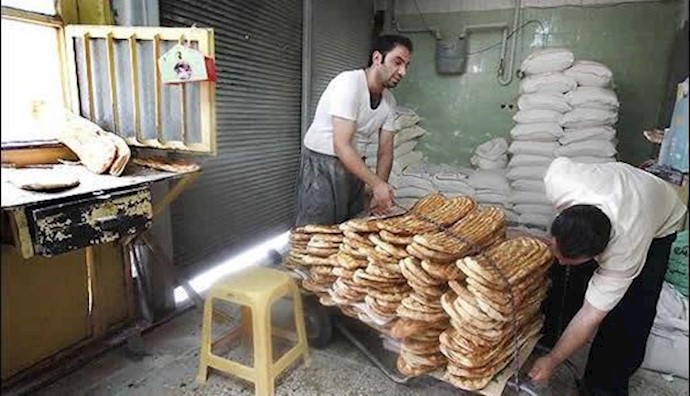Iranians pay for bread in installments in southern Iran
by Cyrus Yaqubi
Some bakers confiscate the customer’s national ID card until the debt is paid
Bakeries in Iran are selling bread in installments to impoverished Iranians, according to a report by a state-run website. According to the report by Tejarat News website bakers were keeping books to record loans handed out to their customers for bread.
Bread in installments in southern provinces
A baker in Qasr-e-Qand, in the southeastern province of Sistan and Baluchestan told the website he had also had a hard time making ends meet and could not continue to “loan” bread to his customers. Bakeries in Sistan and Baluchestan’s Zabol, Rudan in the southern province of Hormozgan, and Dashti in the southern province of Bushehr are also selling bread in installments. Some bakers confiscate the customer’s national ID card until the debt is paid, others just write the names of the customers and the loaned amount.
Subsidies are their only source of income
Rahim Parmouteh, another baker in Sistan and Baluchestan said there are many families here who rely on subsidies as their only source of income. These 8-9 member families get only a total of 45,500 tomans (less than $2) as subsidies per month.
The baker said the families wait the whole month to pay their bread loans with their meager subsidies. “Why doesn’t the government create jobs, so families don’t have to wait for the inadequate subsidies?”
Sistan and Baluchestan province has been drought-stricken for years. The soil has become salty, and unsuitable for farming. Fishermen are only allowed to fish from the shore using small fishing nets, however large fishing trawlers have not left any fish for local fishermen.
Many locals used to work at the ports but due to the coronavirus pandemic, the ports have been emptied for months.
Absolute poverty
Sixty million Iranians live under the line of poverty due to the regime’s systematic lack of supervision over the economy, an Iranian economist said. Speaking to Tabnak, a website affiliated with the regime, Ibrahim Razaghi said “the most important threat to Iran was extreme poverty, widespread unemployment, the inability of many people to pay their rent, and that the rich were getting richer.”
According to state-run media, more than 19 million Iranians live in 3,000 slums and make up the 35% of Iran’s urban population.
Based on official figures published in October, half of Iran’s population live in absolute poverty. The report published by the Statistical Center of Iran also said Iranians were not able to buy basic groceries. Average Iranians eat 52% less red meat, while those with lower incomes eat 65% less red meat compared to last year, the report said. Iranians are also eating 34% less rice, the country’s staple food.
The current poverty line in Iran is 10 million tomans (around $385), while the absolute poverty line is 6.8 million tomans (around $262), which puts 50% of the Iranian population under the line of “absolute poverty”.
Protests are inevitable
A state economic analyst in Iran stated that more protests were imminent if fundamental economic change was not made. Hossein Raghfar said in an interview with the state-run news Sharq Daily, said medicine imported into Iran to treat the ill was being sold in shops for more than ten times the price. “This disturbs the people’s mental, psychological, physical and economic security,”
New official figures show that Iranian families are spending 46% more on the same products and services compared to last year. According to the state-run Borna News Agency, a report published by the Statistical Center of Iran on November 21 shows the country’s year on year inflation has reached 4.46%. This means urban families spent 45% more while rural families spent 50% more on products and services compared to last year.
Raghfar implied that the Organization in Support of Consumers was corrupt.
“What we see today is an organization called the Organization in Support of Consumers, but it is a governmental body that only safeguards the interests of the importers, not that of the people,”
“If we do not answer to the demands of the day, of the society and the people, we should expect tougher, costlier consequences and a more ambiguous future… This knowledge may have been acquired in the country’s decision-making circles, but widespread corruption is the main obstacle to reform,” he added.
Cyrus Yaqubi is a Research Analyst and Iranian Foreign Affairs Commentator investigating the social issues and economy of the middle east countries in general and Iran in particular.



